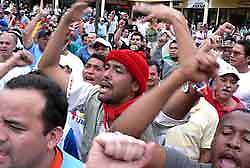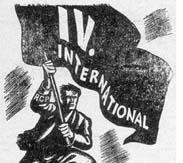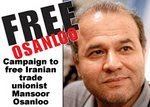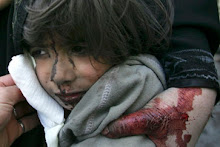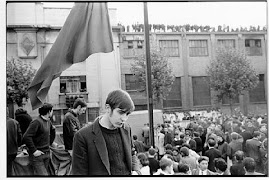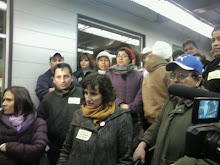Tuesday, August 18, 2009
Friday, August 14, 2009
ARGENTINA: In Zanon, the capitalists have been expropriated!
[From http://www.ft-ci.org] [Cde Alejandro did most of the work on this translation. -- YM]
Videos: http://www.pts. org.ar/spip. php?article13388
"Eight years have already passed: we do not want any more sweet talk we want expropriation!" roared the Zanon ceramics workers, accompanied by a big column of state workers, teachers, health workers, social organizations and leftist parties, on the way to the Neuquén legislature, where they would deal with the expropriation of the factory.
The Patagonian wind blew cold and strong, making the wait in front of the provincial Congress unbearable. The ceramics workers, who, eight years ago, dared and seized the plant, started it producing and made their epic a part of the best pages of working-class history of our country, were proudly singing, "Here they are, these are them, the workers of Zanon!" until their throats grew hoarse.
In the days before, Neuquén was a hotbed. Although the Governor had decided in favor of expropriation, complaints were heard from his own party, the MPN, from the right-wing opposition, and from the [union federation] CGT itself, because the factory was being handed over to "lefties," to "criminals." They did not spare any insult, in order to discredit the exemplary struggle of the ceramics workers. The CGT union bureaucracy and the Chamber of Commerce came out to prevent the expropriation from being approved. But they couldn't.
In the days before, Neuquén was a hotbed. Although the Governor had decided in favor of expropriation, complaints were heard from his own party, the MPN, from the right-wing opposition, and from the [union federation] CGT itself, because the factory was being handed over to "lefties," to "criminals." They did not spare any insult, in order to discredit the exemplary struggle of the ceramics workers. The CGT union bureaucracy and the Chamber of Commerce came out to prevent the expropriation from being approved. But they couldn't.
Videos: http://www.pts. org.ar/spip. php?article13388
The anti-coup resistance in HONDURAS has reached the 48th consecutive day
Wednesday, August 12, 2009
New imperialist bases in COLOMBIA
From http://www.ft-ci.org
By Claudia Cinatti
Thursday, August 6, 2009
By Claudia Cinatti
Thursday, August 6, 2009
Álvaro Uribe has just signed a new agreement with Barack Obama for the installation of US soldiers in another seven bases on Colombian territory, that would substitute for the base at Manta, Ecuador, that the United States is vacating because of Rafael Correa's decision not to renew the lease which expired after ten years. In this way, Obama has asserted the military and political alliance with Uribe, one of Bush's main allies in the region.
This policy of Uribe has caused tensions with other governments of the region. Venezuelan President Hugo Chávez denounced it as a direct threat, and Brazil complained because it does not agree with the increase in the US military presence in the vicinity of the Amazon. Several Latin American governments, like that of Cristina Fernández de Kirchner, are welcoming President Uribe, who organized a regional tour to reduce opposition to his military policy in view of the next meeting of UNASUR, which will be held in Quito on August 10.
On August 5, a demonstration was held in Buenos Aires, repudiating Uribe's visit and the installation of new US military facilities, which constitute a concrete threat to all the peoples of the region. It is necessary to strengthen the mobilization throughout Latin America to expel imperialism from our continent.
With the excuse of the "fight against drug trafficking" under Clinton and with Bush's "war against terror," Colombia has become the main military concentration of the United States in Latin America, with thousands of agents, advisers, and intelligence services that have been devoted to training paramilitary militias and death squads, responsible for the assassinations of union leaders, campesinos and members of the FARC. The military incursion into Ecuadorean territory against a FARC camp in March 2008, in which Raúl Reyes was killed, was organized from these bases.
On August 5, a demonstration was held in Buenos Aires, repudiating Uribe's visit and the installation of new US military facilities, which constitute a concrete threat to all the peoples of the region. It is necessary to strengthen the mobilization throughout Latin America to expel imperialism from our continent.
Thursday, August 6, 2009
In VENEZUELA, the draft law on "media crimes" is no longer current
LE MONDE.FR 06 AUG 09 13:55 hours • Updated 06 AUG 09 13:55 hours
By Marie Delcas, Bogota Correspondant
The media remain at the heart of Venezuelan political debate. Presented on Monday, August 3, a bill on "media crimes" was buried on Wednesday. "Examining it is not a topic," Ivan Zerpa, secretary general of the Assembly, specified. Several deputies from Chávez' majority had expressed their disagreement with the text, presented by the Republic's top prosecutor, Sra. Luisa Ortega.
But, during a press conference, President Hugo Chávez defended the need for the state to regulate press freedom. "While laws and a constitution exist, no freedom is without limits," the Chief of State recalled, on Wednesday. "If you want to live where there is no law, then go live with Tarzan in the jungle."
Frequencies not renewed
The bill proposed punishments of up to 4 years in prison for the authors of "false" or "manipulated" news undermining "social peace, national security, or public morality." The text caused an outcry among NGO's like Human Rights Watch, Amnesty International and Reporters without Borders. Anxiety of the media and of those who defend freedom of the press is accordingly more intense because, since Sunday, 32 radio stations and 2 local television stations have stopped broadcasting, the national television commission (Conatel) having decided not to renew their frequency. If the commission is to be believed, the punished operators had failed to observe technical and administrative standards. Some two hundred other radio and television stations could experience an identical fate.
The topic contributes to increasing the divisions in the country. President Hugo Chávez considers that privately-owned media -- that remain virulently opposed to him -- are in the hands of an reactionary, even pro-coup, oligarchy. For the opposition, on the other hand, the government is trying to muzzle the press and put an end to freedom of expression.
The tension makes itself felt in the street. On Tuesday, in the east of the country, a demonstration in support of one of the silenced radio stations turned into a confrontation between "chavistas" and "anti-chavistas." Ten people were injured. The day before, thirty supporters of President Hugo Chávez -- some of them armed -- had surrounded the headquarters of the Globovisión television channel, very critical of the government. Security cameras filmed the scene, the tear-gas grenades thrown by demonstrators and the presence among them of Lina Ron, leader of hard-line "chavismo."
The public prosecutor immediately ordered the arrest of the political leader. Hugo Chávez approved the measure and publicly condemned the attack against Globovisión headquarters. "Acts of this nature cannot be tolerated, whether they come from the opposition or not, from revolutionaries or from pseudo-revolutionaries or from whoever it might be," the Chief of State declared. On Wednesday, Lina Ron surrendered to the authorities.
Globovisión is the object of five administrative processes and one judicial investigation for "incitement to violence."
By Marie Delcas, Bogota Correspondant
The media remain at the heart of Venezuelan political debate. Presented on Monday, August 3, a bill on "media crimes" was buried on Wednesday. "Examining it is not a topic," Ivan Zerpa, secretary general of the Assembly, specified. Several deputies from Chávez' majority had expressed their disagreement with the text, presented by the Republic's top prosecutor, Sra. Luisa Ortega.
But, during a press conference, President Hugo Chávez defended the need for the state to regulate press freedom. "While laws and a constitution exist, no freedom is without limits," the Chief of State recalled, on Wednesday. "If you want to live where there is no law, then go live with Tarzan in the jungle."
Frequencies not renewed
The bill proposed punishments of up to 4 years in prison for the authors of "false" or "manipulated" news undermining "social peace, national security, or public morality." The text caused an outcry among NGO's like Human Rights Watch, Amnesty International and Reporters without Borders. Anxiety of the media and of those who defend freedom of the press is accordingly more intense because, since Sunday, 32 radio stations and 2 local television stations have stopped broadcasting, the national television commission (Conatel) having decided not to renew their frequency. If the commission is to be believed, the punished operators had failed to observe technical and administrative standards. Some two hundred other radio and television stations could experience an identical fate.
The topic contributes to increasing the divisions in the country. President Hugo Chávez considers that privately-owned media -- that remain virulently opposed to him -- are in the hands of an reactionary, even pro-coup, oligarchy. For the opposition, on the other hand, the government is trying to muzzle the press and put an end to freedom of expression.
The tension makes itself felt in the street. On Tuesday, in the east of the country, a demonstration in support of one of the silenced radio stations turned into a confrontation between "chavistas" and "anti-chavistas." Ten people were injured. The day before, thirty supporters of President Hugo Chávez -- some of them armed -- had surrounded the headquarters of the Globovisión television channel, very critical of the government. Security cameras filmed the scene, the tear-gas grenades thrown by demonstrators and the presence among them of Lina Ron, leader of hard-line "chavismo."
The public prosecutor immediately ordered the arrest of the political leader. Hugo Chávez approved the measure and publicly condemned the attack against Globovisión headquarters. "Acts of this nature cannot be tolerated, whether they come from the opposition or not, from revolutionaries or from pseudo-revolutionaries or from whoever it might be," the Chief of State declared. On Wednesday, Lina Ron surrendered to the authorities.
Globovisión is the object of five administrative processes and one judicial investigation for "incitement to violence."
Tuesday, August 4, 2009
Chavistas physically attack TV station in VENEZUELA
[Incredibly, it is not enough for Chávez and chavistas that the pro-censorship Venezuelan government has just shut down dozens of media outlets and threatens to silence 200 more. Chávez' followers have now launched a (first) terrorist attack on a dissident TV station, and even that is not sufficient. As reported below, the National Assembly is now discussing a law that would put journalists in jail for publishing criticism of great leader Chávez. What Chávez worshippers refuse to understand is that such repressive legislation can always easily be used against workers' organizations and the left. That's why it must be opposed. -- YM]
[From http://news.bbc.co.uk/2/hi/americas/8184671.stm]
Page last updated at 23:40 GMT, Tuesday, 4 August 2009 00:40 UK
Chavez backer held over TV attack
A pro-government activist in Venezuela has handed herself over to the authorities a day after a violent attack on an opposition TV station.
President Hugo Chavez said left-wing militant Lina Ron, who has been one of his most ardent supporters, would now face the full weight of the law.
He deplored the attack on Globovision TV, and said it would help his opponents brand him as a tyrant.
More than 30 people stormed the station in Caracas, firing tear gas.
"She [Lina Ron] handed herself in, and it's good that she presented herself, and has been arrested. There was no other alternative," Mr Chavez said.
He described the attack as a "counter-revolutionary" act, saying that it "gives the enemy weapons to attack me even more as a tyrant".
The attackers have been identified by officials as activists from from the Union Patriotica Venezolana (UPV), which supports Mr Chavez.
Globovision, which has been highly critical of President Chavez, is facing several investigations that could also take it off air.
New media bill
Monday's attack came as the arguments over control of the media in Venezuela became increasingly bitter.
Thirty-four radio stations were ordered off air after the government said they were in breach of the rules for registering or had allowed their broadcast licences to expire. Some 200 other stations are under investigation.
The government in Caracas says it is trying to make the media more democratic.
"The state is retaking control of concessions that were being used in an illegal way over more than 30 and 40 years," said Public Works Minister Diosdado Cabello, who is the head of the telecommunications agency.
"It's an act of justice."
But critics say the move is aimed at giving more space to media that support Mr Chavez and is an attempt to muzzle any critical voices.
Venezuela's National Assembly is due on Tuesday to begin discussing legislation under which journalists could be imprisoned for up to four years for broadcasting or publishing material that attacks "the peace, security, and independence of the nation and the institutions of the state".
Venezuela still has many private radio stations and newspapers that are stridently opposed to the president but in recent years the government has built up its network of state-run media.
[From http://news.bbc.co.uk/2/hi/americas/8184671.stm]
Page last updated at 23:40 GMT, Tuesday, 4 August 2009 00:40 UK
Chavez backer held over TV attack
A pro-government activist in Venezuela has handed herself over to the authorities a day after a violent attack on an opposition TV station.
President Hugo Chavez said left-wing militant Lina Ron, who has been one of his most ardent supporters, would now face the full weight of the law.
He deplored the attack on Globovision TV, and said it would help his opponents brand him as a tyrant.
More than 30 people stormed the station in Caracas, firing tear gas.
"She [Lina Ron] handed herself in, and it's good that she presented herself, and has been arrested. There was no other alternative," Mr Chavez said.
He described the attack as a "counter-revolutionary" act, saying that it "gives the enemy weapons to attack me even more as a tyrant".
The attackers have been identified by officials as activists from from the Union Patriotica Venezolana (UPV), which supports Mr Chavez.
Globovision, which has been highly critical of President Chavez, is facing several investigations that could also take it off air.
New media bill
Monday's attack came as the arguments over control of the media in Venezuela became increasingly bitter.
Thirty-four radio stations were ordered off air after the government said they were in breach of the rules for registering or had allowed their broadcast licences to expire. Some 200 other stations are under investigation.
The government in Caracas says it is trying to make the media more democratic.
"The state is retaking control of concessions that were being used in an illegal way over more than 30 and 40 years," said Public Works Minister Diosdado Cabello, who is the head of the telecommunications agency.
"It's an act of justice."
But critics say the move is aimed at giving more space to media that support Mr Chavez and is an attempt to muzzle any critical voices.
Venezuela's National Assembly is due on Tuesday to begin discussing legislation under which journalists could be imprisoned for up to four years for broadcasting or publishing material that attacks "the peace, security, and independence of the nation and the institutions of the state".
Venezuela still has many private radio stations and newspapers that are stridently opposed to the president but in recent years the government has built up its network of state-run media.
VENEZUELA: The government occupies coffee factories
[Webster defines a quintal, a measure used in the following story, as 100 kilograms, i.e., 220.46 pounds. The nationalizations mentioned in the second paragraph were actually purchases by the Chávez government, at very generous prices, of energy and telecommunications firms. As the story indicates, the occupations of the coffee production factories will be temporary. Chávez has great respect for the sanctity of private ownership of the means of production; one can see that from the fact that after ten years of Chávez in power, Venezuelan workers are still exploited by capitalists. So if the coffee industry is nationalized, the owners will undoubtedly get very, very large compensation for their factories, which proves, once again, that chavismo is simply a lot of flatulent rhetoric, nothing more. Where workers have, in fact, recovered owner-abandoned enterprises and restarted those factories under workers' self-management, as in the case of Sanitarios Maracay, the Chávez government refused to nationalize those enterprises. Just last month, workers from the Vivex enterprise, occupied by its workers for 7 months, marched all the way from Barcelona, Venezuela, to Caracas, 300 kilometers in 12 days, hoping to be allowed to talk to Chávez and persuade him to nationalize their enterprise; those workers were apparently never received by the Venezuelan President. For details, see http://venezuela.elmilitante.org/content/view/6533/164/-- YM]
Venezuela : The government occupies coffee production factories
LEMONDE.FR with AFP 03.08.09 17:24 hours
On the morning of Monday, August 3, Venezuela's socialist [sic] govenment ordered the temporary occupation of the factories of two local coffee producers, accused especially of fraudulent and "monopolistic" practices at the root of the shortage of this product in the country.
"The Bolivarian government has occupied all the factories in the country of the company Fama de América and of Café Madrid, to guarantee supplies for the Venezuelan people," the Minister of Agriculture, Elías Jaua, explained to state-run television. These occupations come within the scope of the law on food sovereignty, promulgated at the end of last year by the antiliberal President Hugo Chávez, who is strengthening control over production by food companies, in order to fight against shortages. As part of his socialist revolution [sic], the Venezuelan President has already nationalized several key sectors of the economy, like energy or telecommunications.
Disloyal and monopolistic practices
According to an association, Alianza Agroalimentaria, coffee production went from 1,400,000 quintals in 1998 to 900,000 today. The Minister indicated that the occupation of the factories should last three months, the time to carry out a complete audit of the two enterprises. "If we could show that smuggling, retentions, disloyal and monopolistic practices had taken place, we could consider nationalization of these enterprises," he specified.
In recent months, the Venezuelan government has ordered the occupation and expropriation of several enterprises producing staples, like rice or pasta, in an attempt to put an end to chronic shortages. Since 2003, the biggest Latin American oil exporter has put in place a strict regime of price control for staple foods. Food producers regularly denounce this measure, asserting that prices do not even cover their production costs.
Venezuela : The government occupies coffee production factories
LEMONDE.FR with AFP 03.08.09 17:24 hours
On the morning of Monday, August 3, Venezuela's socialist [sic] govenment ordered the temporary occupation of the factories of two local coffee producers, accused especially of fraudulent and "monopolistic" practices at the root of the shortage of this product in the country.
"The Bolivarian government has occupied all the factories in the country of the company Fama de América and of Café Madrid, to guarantee supplies for the Venezuelan people," the Minister of Agriculture, Elías Jaua, explained to state-run television. These occupations come within the scope of the law on food sovereignty, promulgated at the end of last year by the antiliberal President Hugo Chávez, who is strengthening control over production by food companies, in order to fight against shortages. As part of his socialist revolution [sic], the Venezuelan President has already nationalized several key sectors of the economy, like energy or telecommunications.
Disloyal and monopolistic practices
According to an association, Alianza Agroalimentaria, coffee production went from 1,400,000 quintals in 1998 to 900,000 today. The Minister indicated that the occupation of the factories should last three months, the time to carry out a complete audit of the two enterprises. "If we could show that smuggling, retentions, disloyal and monopolistic practices had taken place, we could consider nationalization of these enterprises," he specified.
In recent months, the Venezuelan government has ordered the occupation and expropriation of several enterprises producing staples, like rice or pasta, in an attempt to put an end to chronic shortages. Since 2003, the biggest Latin American oil exporter has put in place a strict regime of price control for staple foods. Food producers regularly denounce this measure, asserting that prices do not even cover their production costs.
Subscribe to:
Posts (Atom)

